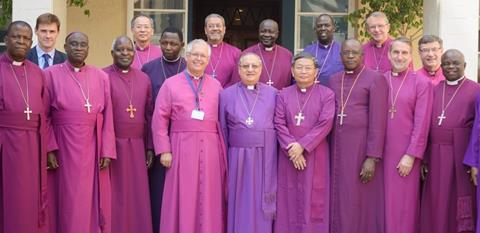The Church should not be an echo chamber, says George Pitcher. Splitting over disagreements about same-sex marriage is not what Jesus modelled

Unity is unfashionable – and I’m not talking about the Mitford sister. We used to aspire to unity. We used to think that unity of purpose and of will were good things.
Note, I am not talking about uniformity, which is soulless and boring, but the kind of unity that affirms we’re all in this together. The type that takes the greatest satisfaction not in imposing our own convictions on others, but investing time in working together for the common good.
By contrast, look around you and everywhere the message is that it’s my way or the highway. If you don’t like it, sling your hook. And if you’re not one of us, you’re the enemy.
Our mainstream political parties are the worst. Perhaps it’s because he was less elected than anointed, but Rishi Sunak’s prime ministerial promise to bring unity is already looking shaky. As the right-wing of his party turn on him over the Gordian knot of Northern Ireland’s post-Brexit position in Europe, it may well turn to dust.
Meanwhile, Sir Keir Starmer feels enjoined to play the hard-bitten political gangster that he patently isn’t, turning on his opposition benches to tell them that left-wingers (who bear the mark of Cain that is the casually thoughtless insult “Corbynistas”) have no place in his new, improved Labour Party.
Shouting down democracy
Social media, rightly or (more probably) wrongly, takes much of the rap for this. We’re told that they have created “echo-chambers” in which we only contemplate the validity of our own opinions, rather than those of others. But I reckon it’s far worse. Social media is a megaphone, designed solely to shout down those who oppose us. So much for the democracy that it promised to enhance.
It’s why, if you voted for Brexit, you’re a racist Little Englander and, if you’re a remainer (sorry, “remoaner”) you’re part of a federal European conspiracy.
The unity that Christ offers can only be unconditional
Worried sick about climate change? You’re a Marxist wrecker of western capitalism. Doubt the methodologies of climate campaigners? Then you’re a climate-denier (and note the contrived toxicity of “denialism” here).
Believe in the Union of Britain? Then good riddance to Nicola Sturgeon – how dare she have aspired to self-determination for the Scottish people!
First among equals
Pitifully, it’s the same within the Church. This week, the Global South Fellowship of Anglicans (GFSA) announced that twelve of its archbishops are “no longer able to recognise the present Archbishop of Canterbury as the first among equals leader of the global communion”. The move follows the Church of England’s decision to allow blessings of same-sex couples.
Cue a massive eye-roll. Here we go again. It was another gang of Global Southerners, supported by a bunch of ambitious, renegade CofE bishops, who tried to overthrow Rowan Williams, then-Archbishop of Canterbury, at the 2008 Lambeth Conference.
I say “ambitious” because it was undoubtedly a power play. They see the global Anglican communion as a post-imperial British relic and want that power transferred, principally to Africa. There’s an irony to this in the dissidents’ statement, which refers to the Archbishop of Canterbury as “first among equals”. The position is, indeed, primus inter pares; as equals, there is no power to be transferred. But they want it anyway.
A common language
The current Archbishop and Williams’s successor, Most Rev Justin Welby, began this month’s Synod - which opened the Church door to same-sex blessings - with an appeal for all parties to speak a common Christian language, for the sake of a scriptural unity that we have squandered. We may not agree, but we can disagree together. Otherwise we become a Church “turned in on itself, narcissistic, imposing unity through force.”
It was a triumph of hope over expectation. The very narcissism to which he referred, which is a factional rather than sacramental unity, gave us the threat of a breakaway Global South – and the Archbishop in tears at the conclusion of Synod.
But Welby’s point, essentially, was a sound and doctrinally durable one. There is nothing in the Gospels to encourage the oxymoron of factional unity. The unity that Christ offers can only be unconditional.
We may not agree, but we can disagree together
It’s why the Pharisees call him a “glutton and a winebibber” (Matthew 11:19, NKJV) for dining with sinners; why he hangs out with unclean lepers, despised foreigners and adulterers; why he heals a Roman centurion’s servant and scolds Peter for drawing his sword on those who arrest him; why he stands silent in his defence in front of Pontius Pilate.
Because unity that is factional is no unity at all. This would be platitudinous were it not for the need in the public sphere for a better and more committed model for unity. And that model is Christian.
While politicians (and ambitious prelates) adopt megaphone diplomacies to win coercive, traduced versions of unity, the unalloyed version of Christian unity, by contrast, is never more required.
It is the unity that is the unconditional acceptance of the other. And, at the start of Lent, it’s the kind of unity that is presented as the first of the seven words from the cross: “Forgive them, for they know not what they do” (Luke 23:24).






































1 Reader's comment